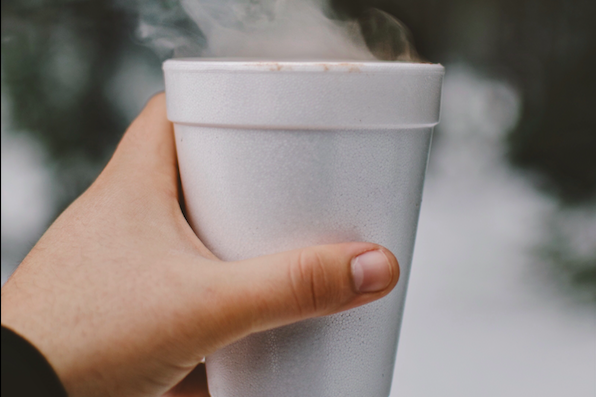
If you are a Styrofoam packing peanut or take-out food container, 2020 doesn’t look so great for you in New York state.
A proposal introduced by New York Gov. Andrew Cuomo late last month would be the largest ban of expanded polystyrene (EPS, more commonly known as Styrofoam) in the country. If passed, as many expect it will be, the ban would cover 20 million people when it takes effect in 2022, making this ubiquitous single-use plastic a thing of the past in the Empire State.
The proposal comes on the heels of an EPS ban New York City implemented last year.
"Styrofoam is one of the most common pollutants and a public health hazard that impacts humans and the environment alike," Gov. Cuomo said in a press release. "This material is everywhere, and it will continue to pollute our waters and harm our wildlife for generations to come if we do not act."
The surge to end single-use plastic waste continues
Cuomo’s latest proposal comes a year after he signed into law legislation banning single-use plastic bags in the state. That ban goes into effect in March.
This latest environmental move comes as the food take-out business has skyrocketed thanks to the growing popularity of delivery companies such as Door Dash, Grubhub and Uber Eats. The online food delivery market was worth $34.31 billion in 2017, and by 2030, it is estimated that it will reach $91 billion.
While delivery services offer customers convenience, some environmentalists say it comes at a cost in the form of excessive single-use plastic.
Under Cuomo’s proposed Styrofoam ban, violators would be fined $250 for the first offense, and up to $2,000 for repeated violations. The ban exempts building insulation, prepackaged food sealed prior to receipt at a restaurant or foodservice establishment, and packaging for uncooked or raw meat, fish or eggs.
While Cuomo’s proposal would be the largest of its kind, it wouldn’t be the first state-wide ban. This honor goes to Maine, whose EPS ban will go into effect in 2021, followed by Vermont and Maryland. Bans are pending in several other states such as Colorado, Oregon and New Jersey, while some 200 cities and municipalities already have bans on the books, including San Francisco, Los Angeles and Minneapolis.
Styrofoam: From marvel to villain
When introduced by Dow Chemical in 1941, Styrofoam was considered a technical marvel: an inexpensive, lightweight material that could hold in heat and cold. Seemingly overnight, EPS was an integral part of our lives, keeping our Big Macs warm, fragile deliveries safe and take-out ice cream cold. From 2002 to 2015, experts say about 316 million metric tons of Styrofoam were produced globally.
Today, Styrofoam’s glimmer has faded and it is now considered a major environmental and health hazard. It’s virtually non-biodegradable, taking up space in landfills together with other single-use plastics. It's also a major polluter of waterways. Beyond its environmental impact, the World Health Organization has classified EPS as a “probable carcinogen.”
So, what can businesses do?
One company that isn’t sitting still is Dunkin' Donuts, which served its hot drinks in insulated Styrofoam cups for decades. In 2018, the chain announced plans to eliminate all polystyrene foam cups from stores worldwide by April 2020.
The Massachusetts-based company told NBC News in November that it's well on its way to completing that goal, with many locations already rolling out a new double-walled paper cup for hot beverages. According to the NBC report, Dunkin's new paper cup is lined with plastic, so it's not actually recyclable, but the lid is made of polypropylene and can be recycled in towns that offer recycling for No. 5 plastics.
One of Dunkin's top competitors, Starbucks, acted decades earlier. It began rewarding customers with a discount when they brought in personal cups or mugs all the way back in 1985. In 2013, the coffee chain launched a $2 reusable cup in the U.S. and Canada and sold similar cups in the U.K. for 1 British pound.
East Coast fast-casual restaurant chain Dig has taken another approach, launching a pilot called Canteen in 2019. Customers who install a smartphone app (Canteen by Dig) and consent to a fee of $3 a month can take their lunch with them in a hard-shelled, reusable bowl made from black melamine, complete with a white plastic lid. They can then trade in their used bowls for fresh ones during their next visit, and Dig will wash and reuse the containers. The pilot is thought to be the first “closed-loop” program for take-out containers in New York City, New Food Economy reports.
On the West Coast, Zume, Inc., known for its automated pizza delivery restaurants in California, recently earned top marks from the DuPont Awards for Packaging Innovation for its Pizza Pod made from compostable and biodegradable sugarcane fiber. As reported in Forbes, the company recently launched Zume Source Packaging that uses plant-based materials to create a cost-competitive alternative to plastic. The launch was supported by the company's recent acquisition of Pivot Packaging and its new 70,000-square-foot manufacturing plant in Southern California.
For local “mom and pop” restaurants, food trucks, delis and grocery stores, a broad range of packaging options exist beyond Styrofoam, including products made from recycled paper, sugarcane and mushrooms — even edible seaweed.
One company finding opportunity in the green-container sector is Loliware, which bills itself as the world's leading seaweed-based material technology company replacing single-use plastics. The company first introduced seaweed-based straws, but plans to expand into cups, lids, utensils and packaging made entirely of kelp. Customers already include Marriott hotels and the Museum of Modern Art (MoMA) in New York.
The downside for many small businesses, however, is that environmentally friendly packaging comes at a cost. But for some, it doesn’t matter.
“If you were buying a case of [Styrofoam] takeout boxes for $25 and the cost of buying a case of biodegradable takeout boxes is $64, it does add to the bottom line, but I think it’s worth every penny,” John Engman, owner of the California chain Breakfast Republic, told the nonprofit Food Print. "I want to have a conscience and run a restaurant that is at least trying to make a move in the right direction."
And with that, it’s a wrap. An environmentally friendly, biodegradable wrap.
Image credit: Caleb Lucas/Unsplash

Maggie Kohn is excited to be a contributor to Triple Pundit to illustrate how business can achieve positive change in the world while supporting long-term growth. Maggie worked for more than 20 years at the biopharma giant Merck & Co., Inc., leading corporate responsibility and social business initiatives. She currently writes, speaks and consults on corporate responsibility and social impact when she is not busy fostering kittens for her local animal shelter. Click here to learn more.














